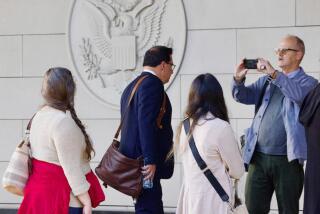L.A.’s ex-deputy mayor headed to prison: ‘Corruption at any level will not be tolerated’

A federal judge on Friday sentenced former Los Angeles Deputy Mayor Raymond Chan to 12 years in prison for his role in a sprawling City Hall corruption case that also brought down a former council member.
U.S. District Court Judge John F. Walter handed down the sentence in a courtroom packed with Chan’s supporters, stating that “corruption at any level will not be tolerated.”
A jury in March found Chan guilty on a dozen counts — including racketeering conspiracy, bribery, honest services fraud and giving false statements to investigators — in a case focused on financial benefits provided by real estate developers with projects in former Councilmember Jose Huizar’s district.
Officials said Chan solicited and accepted more than $750,000 in bribe money for himself and facilitated more than a million dollars in bribes to Huizar from property developers.
“Chan abused his public office and sought to deepen the corruption of city politics for the benefit of his own business interests,” U.S. Atty. Martin Estrada said in a statement.
Chan’s sentence, Estrada added, “sends a message to the public and City Hall alike that our government should not be for sale and those that undermine our democracy through pay-to-play schemes will be prosecuted to the fullest extent of the law.”
A Chinese millionaire, a cop for hire and an Irvine family: Inside a twisted global business dispute
Federal prosecutors say former L.A. County Sheriff’s employees helped a woman in China extort her former business partner for $100 million in disputed shares.
On Friday morning, Chan’s attorney, Michael Freedman, argued that his client didn’t deserve a sentence “anywhere close” to that of Huizar, who was sentenced in January to 13 years on racketeering and tax evasion charges. Chan’s defense team requested less than three years.
“This wasn’t Mr. Chan’s enterprise,” Freedman told the judge. “This was obviously Mr. Huizar’s enterprise.”
Freedman declined to comment after the hearing.
When Chan, 68, addressed the judge, he said he took “full responsibility” and called this “the most challenging time of my life.”
“I’m here just pleading for your mercy,” Chan told the judge.
During the trial, federal prosecutors portrayed Chan as a central figure in a series of schemes involving bribes from downtown real estate developers.
Chan worked for the city for more than three decades, much of it at the Department of Building and Safety, where he ascended to the top job. In 2016, he was hired by then-Mayor Eric Garcetti to serve as deputy mayor over economic development, supervising the Planning Department, Building and Safety and other city agencies. He held that job for slightly more than a year.
Huizar admitted last year that he received a wide array of bribes and other benefits from downtown developers, including gambling chips at casinos, flights on private jets, campaign contributions, luxury hotel stays, concert tickets and services from prostitutes.
During Chan’s trial, prosecutors portrayed him as a crucial intermediary between Huizar, who wielded huge power over downtown development projects, and Chinese real estate developers.
The wealthy operator of a cryptocurrency trading platform allegedly paid a number of L.A. County sheriff’s deputies to perform unlawful searches and arrests, according to a criminal complaint unsealed Thursday.
In one particular scheme, prosecutors said, Chan helped Huizar secretly settle a sexual harassment lawsuit filed by a former aide. Billionaire Wei Huang, owner of the Chinese development company Shen Zhen New World I, provided Huizar with $600,000 in collateral that allowed Huizar to secure a bank loan and pay off the aide, they said.
Chan was the last defendant charged in the City Hall pay-to-play investigation — dubbed “Casino Loyale” by the federal government due to Huizar’s frequent Las Vegas trips — to go on trial.
Walter ordered Chan to pay $752,457 in restitution to the city of L.A. Chan is set to begin serving his sentence on Jan. 6.
Times staff writer David Zahniser contributed to this report.














